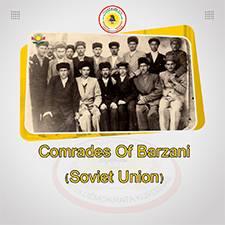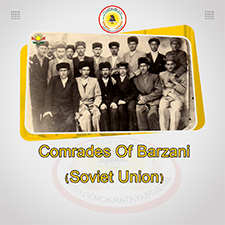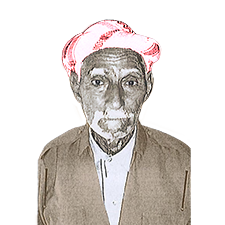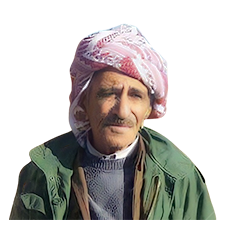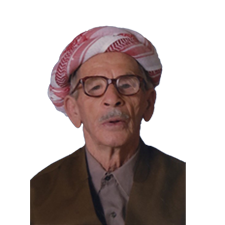Biography
Sulaeman Khal Aal was born in 1913 in the village of Bardari in Piran sub-district in Mergasor district in Erbil Province. On June 21, 1932, he with his family became refugees of Turkey. On October 6, 1988, he passed away in the east part of Kurdistan and was buried there.
Memoirs of Struggle
In 1943, he joined the ranks of the Second Revolution of Barzan, on October 12, 1943, he participated in the capture of the Kherazok police station, and on November 10, 1943, he participated in the capture of the Mazne Police Station, and on 8 August 1945, he participated in the capture of MergaSor police station. On August 19, 1945, by the order of the Iraqi Military Court All of his moveable and immoveable properties were seized.
After the failure of the Second Barzan Revolution, on October 11, 1945 he goes to east of Kurdistan, but his family remains in the south of Kurdistan. On 31 March 1946 he became a peshmarga in the Barzan force of the Kurdistan Democratic Republics Army in Mahabad and participated in the battles of Saqiz front in the Kurdistan Democratic Republic in Mahabad.
He was one of the Peshmergas that on April 19, 1947, returned to the territory of Sherwan and Mazuri through (Khwakurk and Barazagrawa Plains) through the land of Northern Kurdistan.
After their return, General Mustafa Barzani held a meeting with his comrades in Argosh village on May 15, 1947, and allowed them to make a decision to stay, or go to the Soviet Union, where all his comrades decided to continue and go to the Soviet Union. On May 23, 1947, he accompanied General Mustafa Barzani to the Soviet Union and participated in the Battle of the Stream of Qatur and the Battle of the Mako Bridge, and after a lot of hardships and hard work, on June 18, 1947, he crossed the Aras River, which is located in the border between Iran and the Soviet Union, into the Soviet Union.
After their arrival in the Soviet Union, on June 19, 1947, they were placed with all their comrades in the city of Nakhchawan, in the Republic of Azerbaijan, for forty days in a deserted community surrounded by barb wires and guarded by a group of soldiers and regarding food, clothing, and transportation were treated as prisoners of war. Later, on the decision of the Soviet government, they were distributed over the areas of Aghdam, Lachin, Aywlakh and Kalbajar in Azerbaijan. On December 10, 1947, they were transferred to a barracks on the Khazar Sea in The Capital of Azerbaijan, Baku, and on the 23rd of the same month, they were given military uniforms and trained eight hours a day under the supervision of Azerbaijani officers. At the same time, for four hours a day, some of their comrades were taught Kurdish language lessons by some of their literate comrades.
After Jafaar Bagrov's ill treatment of his comrades, Barzani decides to move his military camp from Azerbaijan to The Chirchik community Nearby Tashkent, the capital of Uzbekistan, where they will continue their military training.
In March 1949, he and his friends were distributed as units and groups into the rural villages of the Soviet Union by train and worked in the Kolkhoz farms (land that people rented from the government and then paid the government share back).
After much effort and many letters sent by General Barzani to Stalin, a letter finally arrives in Stalin's hand in which Barzani discusses the problems of his comrades and Stalin immediately decides to form a committee to investigate the situation of Barzani's comrades, and finally the committee's decision is to gather them all in the city of Vrivski, so he will go to the Soviet city of Vrivski in November 1951.
Following the revolution of July 14, 1958 in Iraq and the return of General Mustafa Barzani, on February 25, 1959, in accordance with both Articles Three and Seven and section (A) of Article ten, and working with article 11, in accordance with the amended law No. 19 of 1959, he and his comrades were subjected to general amnesty.
In 1958, the Republic of Iraq was established under the presidency of Abd al-Karim Qasim, the aforementioned returned to Kurdistan on April 16, 1959, with his friends on the Groza ship via Basra port in southern Iraq.
In 1961, he participated in the September Revolution and participated in the battles, and in 1975, after the failure of the September Revolution, he goes to the kingdom of Iran as a refugee and was injured in the bombing of the Zewa community in 1982. It's stayed in Zewa until he passed away.
Sources:
-
حهمید گهردی، پوختهی مێژوونامه، چاپی یهكهم، (ههولێر - دهزگای چاپ و بڵاوكردنهوهی ئاراس - چاپخانهی وهزارهتی پهروهرده - ٢٠٠٤ز).
-
شهعبان عهلی شهعبان، ههندێك زانیاری سیاسی و مێژوویی، چاپی سێیهم، (ههولێر - چاپخانهی ڕۆژههڵات - ٢٠١٣ز).
-
صالح یوسف صوفي، كرۆنۆلۆژیا كوردستانێ و جیهانێ، چاپا ئێكێ، بهرگێ دووێ و سێیێ (دهۆك - چاپخانا پارێزگهها دهۆكێ - ٢٠١٣ز).
-
عمر فاروقی، سردار دانا زندگی و مبارزات مرحوم ملا مصطفی بارزانی، چاپ دوم، (ههولێر - چاپخانهی وزارت آموزش و پرورش - ٢٠٠٢ز).
-
كاروان محهمهد مهجید، بارزانییهكان له مههابادهوه بۆ سۆڤێت، چاپی یهكهم، (سلێمانی - چاپخانهی پهیوهند - ٢٠١١ز).
-
له یادداشتی فهرماندهی شههید حهسۆ میرخان ژاژۆكی، ٦٢ رۆژ لهگهڵ بارزانی دا چوونی بارزانییهكان بۆ یهكێتی سۆڤێت، چاپی یهكهم (ههولێر - چاپخانهی رۆشنبیری - ١٩٩٧ز).
-
لیث عبدالمحسن جواد الزبیدي، ثورة ١٤ تموز ١٩٥٨ في العراق، (بغداد - دارالرشید للنشر - ١٩٧٩م).
-
مسعود بارزانی، بارزانی و بزوتنهوهی رزگاریخوازی كورد ١٩٣١ - ١٩٥٨، (دهۆك - چاپخانهی خهبات - ١٩٩٨ز).
-
نهجهف قولی پسیان، له مهابادی خوێناوییهوه ههتا لێوارهكانی ئاراس، و. شهوكهت شێخ یهزدین، چاپی یهكهم، (پیرمام - یۆبیلی زێڕینی پارتی دیموكراتی كوردستان - ١٩٩٦ز).
-
ئـ.د.ئـ، فایلی ژماره AI-١٠، لیستی ههڤاڵانی مستهفا بارزانی بۆ یهكێتی سۆڤێت، بهڵگهنامه لهلایهن سهگڤان هاڵۆ پێشكهش كراوه، ٢٠١٦ز.
-
ئـ.د.ئـ، فایلی ژماره HB-١٦٤، پارتی دیموكراتی كوردستان، بارهگای بارزانی، لێژنهی باڵای ناوچهی بارزان، فۆرمی سلێمان خاڵ ئالی ئهحمهد، پیرمام، ١ تشرینی دووهمی ٢٠١٨ز.
-
ئـ.د.ئـ، فایلی ژماره١٩٥- ZB، دهقی چاوپێكهوتن لهگهڵ سلێمان سابیر سلێمان لهلایهن سامی عهبدی، پیرمام، ٩ شوباتی ٢٠٢٠ز.




